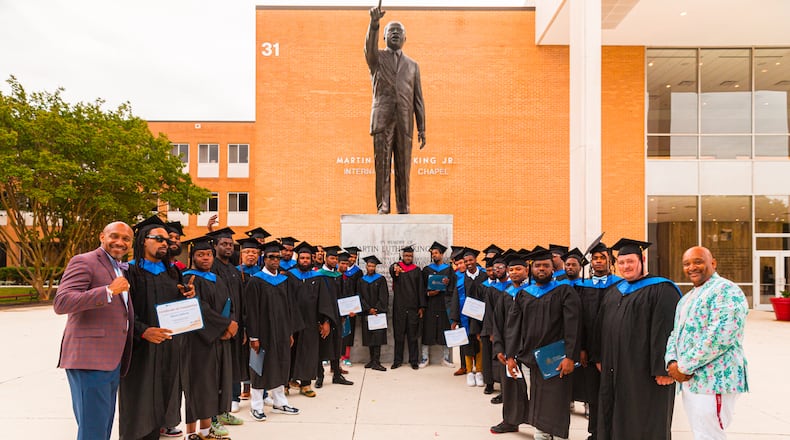Dozens of men, dressed in caps and gowns, proudly took their places inside the Ginger Sullivan Auditorium at the Morehouse School of Medicine on April 12.
The men showed off fresh Fathers Inc. diplomas, indicating they had successfully completed a program to become better fathers and men. In order to graduate, student-dads completed 26 hours of life skills training, in a course offered four times a year since 2021.
Awards were presented to the valedictorian, fathers with perfect attendance and the father with the most children. 225 total children were represented by 103 dads.
The crowd cheered as each name was called, and men paraded one by one across the stage.
“This isn’t that stiff Harvard graduation,” Fathers Inc. project director Javin Foreman announced to the crowd. “We’re going to change the energy a little bit.”
The event was, for some, the first time they had been part of any graduation ceremony. The nonprofit Fathers Inc. literally provided the pathway.
Founded in 2004 by CEO Kenneth Braswell, Fathers Inc. advocates for community building and improvement of family dynamics, specifically the roles of fathers. The organization seeks to boost mental and emotional health in homes, even when economic issues are present or a parent is incarcerated. The purpose of the program is teaching the men to assume more accountability for their actions, and to demonstrate their learnings in their roles as fathers.
Credit: Courtesy of Fathers Inc.
Credit: Courtesy of Fathers Inc.
Since its inception, over 900 fathers from Clayton, Cobb, DeKalb, Fulton, Gwinnett, Henry and Rockdale counties have enrolled in the Fathers Inc. course. More than 700 have graduated.
Many of the men are referred by word of mouth or a judge’s recommendations after involvement in the criminal justice system. Some came from the Gateway Center homeless shelter; others participated while incarcerated at Fulton County Jail.
Directors of Fathers Inc. succeeded with their goal to graduate at least 100 men this spring. The men were mostly Black, between the ages of 19 and 40.
Credit: Courtesy of Fulton County J
Credit: Courtesy of Fulton County J
To promote self-reflection, Fathers Inc. encourages the men to bond over shared experiences. Topics include consistency, emotional control and temperance, communication skills and conflict resolution.
As students, they watch presentations and engage in virtual conversations with facilitators and classmates. Through those interactions, the men — including incarcerated fathers whom program facilitators visit in jail — build relationships and community.
“The secret sauce is transparency and being able to understand that they’re not alone,” Braswell said. “No one is afraid to talk about anything because no one feels anything they say will be held against them. There’s a freedom that occurs.”
Program directors challenge the men to enjoy small victories. That’s why being celebrated in a graduation-like setting is important, the directors say.
Credit: Courtesy of Fathers Inc
Credit: Courtesy of Fathers Inc
In a speech during the ceremony, graduate Daniel Adekanmbi told his classmates they had the same goal: to be useful to their children.
“Being part of this program, one of the secret weapons that the devil uses is to make you feel alone and [that] you are special to your problems. Joining this group, my problems are not special to me anymore,” Adekanmbi said.
Ahead of the graduation, Foreman said current societal trends and American history have dissuaded Black men from showing the vulnerability embedded in fatherhood.
“[Black men] have only been allowed to be fathers for about 200 years. There are just some things that we don’t know about fatherhood. We were never taught to be fathers. So, it’s never been passed down,” Foreman said.
“We have to get these fathers back in these children’s lives.”
Fathers Inc. trainer James “Beau” Gaudreau agreed. “The more dads I get to, the fewer at-risk youth I have,” he said.
Credit: Courtesy of Fathers Inc
Credit: Courtesy of Fathers Inc
Gaudreau said a major issue fathers experience is the legitimation process when their children are born out of wedlock.
“Any demographic that’s living in a lower socio-economic environment, you’re going to see a lot of unwed babies — especially in Black and brown communities. A lot of teenage pregnancies. Babies having babies,“ Gaudreau said. ”It’s a big issue.”
In Georgia, fathers must go through a process to have a legal relationship with their child. Even if the father’s name appears on the child’s birth certificate or there has been a DNA test, he does not have legal authority over his biological children unless he is legitimized.
Despite the legitimation process, facilitators do not allow any of the fathers to complain about their children’s mothers.
“‘No, bro. You have to take responsibility for the decision that you made,’” Foreman recalled telling his group of fathers.
Braswell said men set the temperature for their relationships and must understand how it affects everyone within their ecosystem.
“Understand the matrix that you created,” Braswell said, referring to fathers.
“That’s the definition of manhood. Manhood is the ability to be able to have responsibility over the things that you’ve created. And your measure of manhood is how well you do that.”
Credit: Courtesy of Fathers Inc
Credit: Courtesy of Fathers Inc
In light of the local success of Fathers Inc. and the growing number of men participating in the program, Braswell and his team are on a mission to take the curriculum national.
Fathers Inc. applies for state funding every five years under the Division of Family and Children Services. Now at the end of that funding period, the organization hopes to secure additional funding from the Ready 4 Life and ReFrame grants to create a larger system of cohorts.
Braswell wants to take the program into high schools and constructively discuss family planning with students. He said Fathers Inc. also wants to uplift young adults between the ages of 16 and 24, to foster healthier coparenting relationships in a movement he has called “transformative community empowerment.”
“Part of it is rehabilitation. More of it is healing,” Braswell said. “I can change the nature of metro-Atlanta in the next five years if I focus on solely restoring the relationships between coparents.”
Credit: Courtesy of Fathers Inc.
Credit: Courtesy of Fathers Inc.
Ultimately, Gaudreau said, fathers must take accountability for their choices.
“You don’t get the life that you want. You get the life that you earn.”
Become a member of UATL for more stories like this in our free newsletter and other membership benefits.
Follow UATL on Facebook, on X, TikTok and Instagram.
About the Author
Keep Reading
The Latest
Featured









